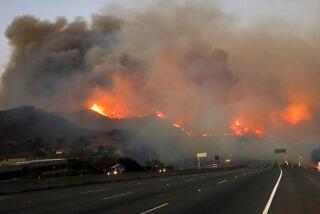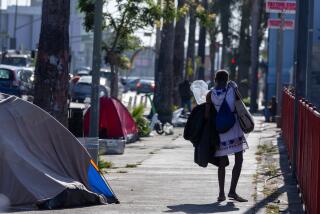County to Seek Tax Hike for Hospitals
Los Angeles County supervisors are expected to do something today that few politicians enjoy--ask voters to help them raise taxes.
With the board expected to place on the November ballot a tax to maintain emergency room services, the supervisors are making a calculated gamble: That the pain of being identified with a tax hike pales in comparison with the problem of slashing the part of their sprawling system that is used by all classes of voters, not just the poor and uninsured.
The political risk for the supervisors is low. All five ran unopposed in the past election cycle, and no incumbent elected supervisor has been beaten at the polls since 1980. But backers and opponents of the tax say the stakes are high.
Proponents describe the tax as the last chance to save a fraying emergency network that treats thousands annually but is threatened by the closing of public hospitals.
“Every man, woman and child is one drunk driver away, one gunshot away, one stabbing away from a trauma center,” said Supervisor Zev Yaroslavsky, who is proposing the tax.
“We hope people who are normally averse to taxes will see the wisdom of this investment.”
Jon Coupal does not. The head of the anti-tax Howard Jarvis Taxpayers Assn. says supervisors need to cut instead of add taxes.
“California and Los Angeles go way beyond federal requirements in terms of general assistance and health care,” Coupal said. “The question becomes, in times of budgetary restraints, why are you providing more health care than required by law?”
“The reaction of most taxpayers,” he concluded, “is, if this is as much of a priority, why don’t you reshuffle what you already have?”
The reshuffling has already begun. Supervisors cut $150 million earlier from their health budget this month to take the first bite from a projected $800-million deficit caused by a loss of federal aid.
But when the health department listed what else would have to be cut to balance the books this fall, the board balked. The list included reducing Olive View-UCLA Medical Center in Sylmar and Harbor-UCLA Medical Center near Torrance to outpatient clinics.
Instead, a majority of supervisors have said in interviews that they are willing to ask voters for more money. The proposed annual assessment of three cents per square foot of developed property would generate an estimated $175 million for emergency services and combating bioterrorism.
That would not solve the county’s financial difficulties, but supervisors hope it would encourage Sacramento or Washington to provide more money by demonstrating that county taxpayers are willing to make a sacrifice.
The supervisors have limited choices on the health front. Put simply, they can either cut services--something they have long resisted--or find new money.
Supervisors could dip into their reserves, where they have an estimated $500 million for one-time emergencies, or borrow money, but both of these alternatives have drawn sharp criticism from financial experts. They could try to persuade Sacramento or Washington to help, but both capitals are wrestling with their own budget deficits.
Proposition 13, the 1978 anti-tax ballot measure that capped property tax increases, leaves counties with few options for generating money. So counties raise funds by adding other taxes. Those taxes can take the form of the parcel tax proposed by Yaroslavsky, which must be approved by two-thirds of voters.
Or they can be some form of a sales tax, such as the fee state Sen. Gloria Romero (D-Los Angeles) has proposed levying on all alcohol sales in the state.
That bill would generate as many as $700 million for emergency health services statewide but it is unclear whether it would pass the Legislature.
Since Proposition 13, Los Angeles voters have shown a willingness to pay more taxes for specific public services. They twice approved half-cent sales taxes for public transportation, and also agreed to pay a parcel assessment of about $19 per parcel to expand parks.
Los Angeles’ proposed health tax, also to be assessed per parcel, is similar to one passed by Alameda County voters in the 1980s. That parcel tax amounts to $23.94 per average single-family home and funds Alameda County’s emergency medical system.
Voters “tend to find dedicated taxes more attractive than general taxes,” said Bill Carrick, a veteran political consultant based in Los Angeles. “We’ve never had, in L.A., an overwhelming public sentiment against dedicated taxes.”
Though public sector unions are expected to push forcefully for the tax, there is some opposition. Supervisor Mike Antonovich has blasted the measure, and is instead proposing that taxpayers be allowed to voluntarily contribute money to health care.
More to Read
Sign up for Essential California
The most important California stories and recommendations in your inbox every morning.
You may occasionally receive promotional content from the Los Angeles Times.











